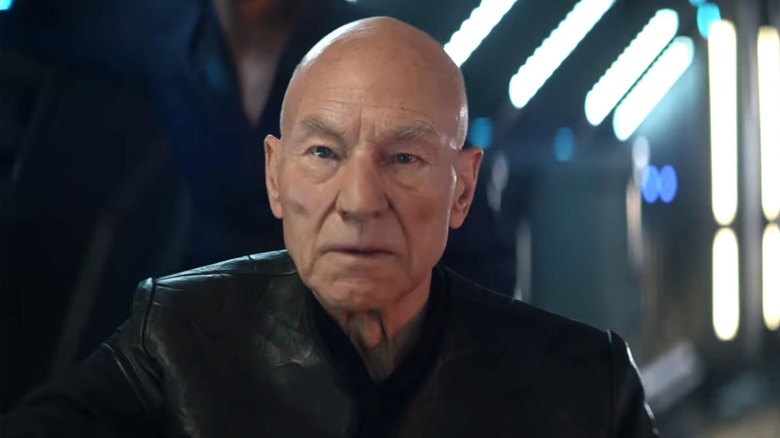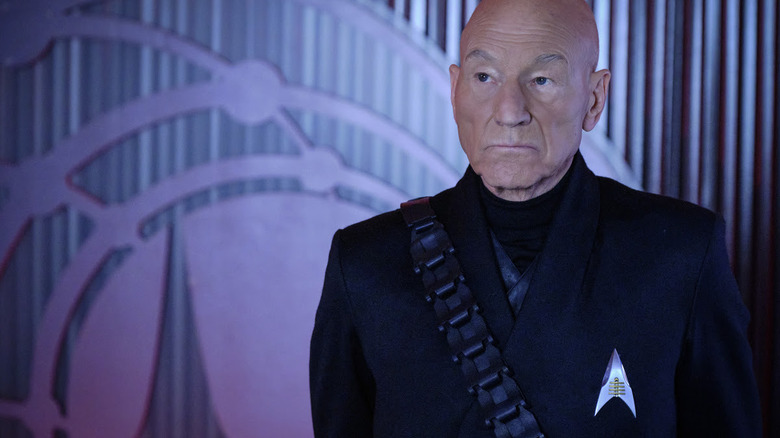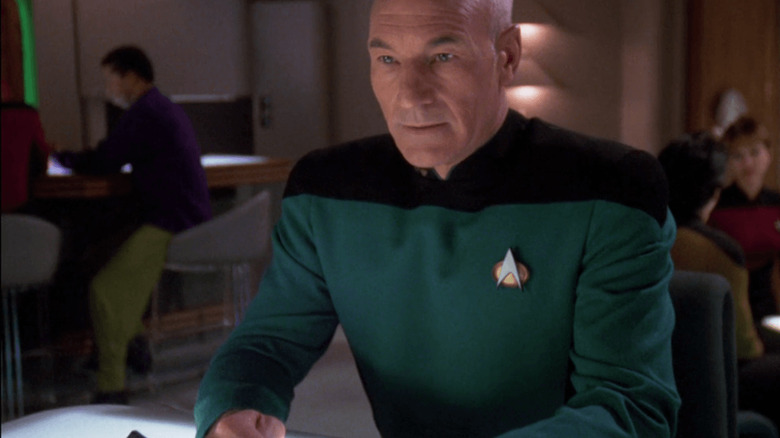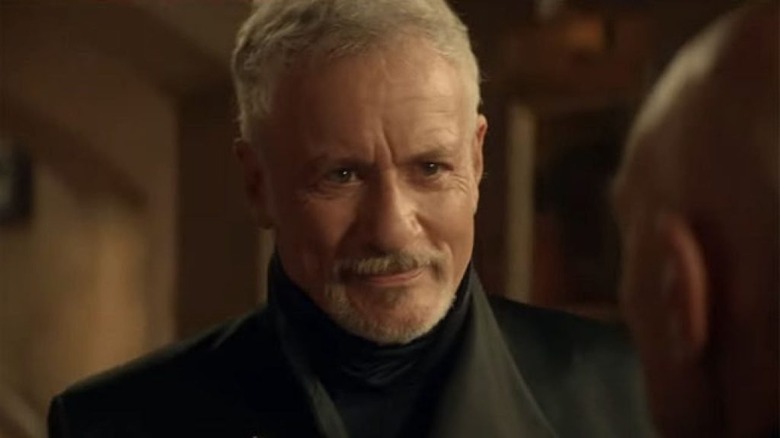Picard Writers Do 'Penance' In Star Trek: Picard Episode 2
Ah, good ol' causality. There's nothing better to whet a Trekkie's appetite for a brainy, overthought conversation about rerum natura than a story about how a small change in a deterministic nonlinear system can result in large differences in a later state. Or, to put it in other words, that Butterfly Effect sure is fun to talk about, eh, fellow nerd? Pass the mead.
"Star Trek" frequently revisits stories with themes of causality, determination, and fate (or lack thereof). Perhaps the best known among them, at least to a newer audience, might be the alternate Kelvin timeline created for the 2009 J.J. Abrams film, wherein a time travel space hole caused a young William Shatner to grow up into Chris Pine. Other Trekkies will also point to the celebrated "Star Trek" Mirror Universe, wherein "evil" parallel versions of all our favorite characters exist. Fans of "Star Trek: Voyager" might point out the two-part episode "Year of Hell," which was about an alien ship captained by Annorax (Kurtwood Smith) that could essentially create new timelines. Annorax was using his calculations and technology to create a timeline wherein his dead wife was still alive, but wreaked havoc on the space-time continuum — and the Voyager — as a result.
There are two "Star Trek" causality stories that will serve as antecedents to the events of "Penance," which involves a dark, alternate version of Picard's timeline wherein Earth is barely surviving under a radiation shield, the planet has become a fascist, conquering, genocidal force in the galaxy, and Picard keeps the skulls of known Trek characters like Sarek and Gul Dukat in his den (!).
'Yesterday's Enterprise' meets 'Tapestry'
The first previous "Trek" episode worth mentioning here is "Yesterday's Enterprise," about the Enterprise-C (the immediate ancestor of Picard's ship) traveling forward in time while embroiled in a fierce battle. The ship vanished from said battle, causing the entire timeline to shift, leading to a present where Picard and co. are now still embroiled in that same war decades later. The solution is to send the Enterprise-C and its entire crew back to the past where they are destined to be destroyed. But, in so doing, the crew will restore the peaceful timeline we all know and love. "Yesterday's Enterprise" is incredibly clever and tactfully deals with causality in interesting ways.
The other episode more significant to "Penance" is "Tapestry," a "Next Generation" ep. wherein the omnipotent trickster god Q (John de Lancie) allowed Picard — perhaps having already died on the operating table due to his artificial heart — to relive a portion of his youth wherein he was grievously injured. Picard does relive his youth, but applies the wisdom and caution of his older age. He can prevent the injury of his past, but his cautious personality leads back to a present wherein Picard is now no longer captain, and is in fact unambitious and weak-willed. It's the best episode of "Star Trek: The Next Generation."
In the "Picard" episode "Penance," Q has returned, politely aging himself. Now the immortal Q looks a lot like John de Lancie does in 2022. I am fine with this conceit, as it visually allows Picard and Q to converse as equals; older men who are both keen on exploring the deep and abiding failures of humanity. Q's goal throughout "Star Trek" has been to reveal to Picard that the universe is larger than his mind can contain, and that humanity is constantly teetering between a massive intellectual shift forward and a headlong reversion back to the violent savagery of its recent past.
At the end of "The Star Gazer," Q had transported Picard — and the rest of the show's main cast — into an alternate timeline on a ruined Earth, revealing to Picard that, but for a twist of fate sometime in the distant past, Earth would be infected with murderous xenophobia and end up destroying most of the galaxy. Picard is a bloodthirsty general in this timeline, Seven of Nine (Jeri Ryan) is the fascist president of Earth (and was never assimilated by the Borg), Dr. Jurati (Allison Pill) is a lot like Josef Mengele, and Raffi, Elnor, and Capt. Rios (Michelle Hurd, Evan Evagora, and Santiago Cabrera) are scattered throughout a hellish landscape of murder and pain.
Q challenges Picard to accept that this is a very real life he could have led.
A fascist Earth
The details of the fascist Earth — not the Mirror universe, mind you — are horrifying. Earth has executed any and all alien dissidents, and, as mentioned above, Picard keeps their skulls in his den (it's here that we learn Ferengi have bones in their ears; who knew?). He has slaves on his vineyard and is expected to be violent and abusive to them. To calmly explain all this to him, we have a handy android butler who doesn't get confused by Picard's questions; a clean narrative conceit that allows the audience get a lot of information organically.
Picard has no memory of his fascist persona, nor do any of the other cast members, who are now expected to behave like monsters. It is also revealed that Earth has taken the last surviving Borg into custody — the Borg Queen from "Star Trek: First Contact" and "Star Trek: Voyager," now played by Annie Wersching — and plans to publicly execute her, with Picard acting as executioner. It's a good thing "The Star Gazer" re-established our characters as being peaceful and far less violent than they had been in the first season, as their season one iterations might be kind of okay with the fascist timeline.
One can't help but think that the title "Penance" refers to "Picard's" writers. This season of Picard — if it continues to play out as well as it has so far — may be a massive act of contrition on their part, apologizing to viewers for restarting "Star Trek" in the streaming age with several seasons of TV devoted almost exclusively to violence, war, catastrophe, and bad ideas. It's nice, now, to go a full episode wherein one of the central characters in "Star Trek" doesn't murder someone. Well, almost. There is a tacked-on confrontation near the end of the episode wherein some bad guys are taken out. Sigh.
Following some of Q's clues, however, the crew knows they have to travel back in time to Los Angeles 2024 — echoes of "The Voyage Home" are already ringing in our ears — to discover what it was Q might have altered to spark the alternate timeline, causing a butterfly effect the size of Mothra. To do so, they must kidnap the Borg queen and use her interdimensional brain to figure out where they need to go in 2024, and what exactly they need to prevent.
Episodic storytelling
"Star Trek" often seems to function better as episodic storytelling rather than as an epic. The season-long arcs of "Star Trek: Discovery" are clunky at best, and often just outright badly written. The first season of "Picard" kept piling on arbitrary mysteries to the point of idiocy. The first two episodes of the second season of "Picard" are, quite mercifully, relatively sealed off. "The Star Gazer" establishes characters and instigates the action. The second episode lays out the premise of the show and expansively reveals the stakes. It offers mysteries, but mysteries that can wait; for instance: Why is Q doing this now? And why does he seem to be so mentally unstable in certain scenes?
The next episode promises to establish our heroes in present-day Earth, and we'll assuredly get a lot of fish-out-of-water scenes as the crew climatizes themselves to 2024. It will be, in short, a separate episode with its own unique tone.
The promise of this season is continuing. Let's hope the other shoe does not drop.



